AI and diagnosis: the legacy of Paracelsus
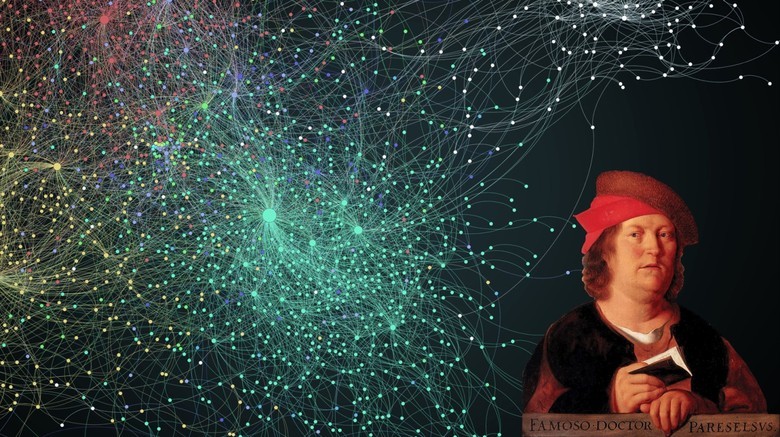
Could it be that the “winter of artificial intelligence”, which began in the late 70s of the last century, has not really ended yet, and all commercial decisions related to the use of AI have become a victim of marketing, have set the rule: you are Is it easier to sell a product if you state that it works on the basis of artificial intelligence? Something similar has happened before. Classic expert systems focused on text-based man-machine interface, flourished in the 1970s and 1980s, and then fell into a deep crisis, from which they never came. It is interesting to draw parallels with modern cognitive systems that have signs of artificial intelligence.
The main success of the era of cognitive computing is now associated with the activities of IBM Watson. But is it really a success, or an attempt to pass the desirable to the real?
The most severe enemy

')
A source
A few years ago, IBM Watson was consistently associated with diagnostic methods in medicine, since it was the first direction in which the supercomputer was used after winning the intellectual program Own Game. Over time, Watson was able to even track Pokemon in the game Pokemon Go. The scope of applications of the IBM cognitive system is wide, but for this article we will evaluate the computer's capabilities in the field of human health. Here the computer has the greatest achievements.
Early diagnosis and the choice of the method of subsequent treatment is one of the most difficult mysteries of humanity in its history. And the higher the lifespan, the more health problems you get. For 500 years, oncology was not considered an urgent problem - everyone had little chance of surviving until the appearance of their own cancer. Today, cancer is one of the main causes of death in the world (say “thanks” to life expectancy).
It cannot be said that oncology is only an “invention” of the 20th century, associated with poor ecology, nuclear tests, preservatives in food and other misfortunes. Cancer was known to the ancient Greeks, they tried to identify and treat it in the Middle Ages, they fought with it by any means, from burning it with iron to praying.
Has anything changed in this bitter competition, where the stake is human life, with the advent of Watson? Of course. But first you should talk about the fight that was lost.
Diagnosis as a method of divination

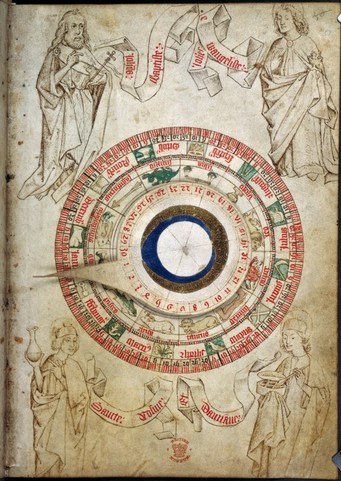
Human anatomy, as previously thought, has a direct relationship with the zodiac constellations. Source
IBM Watson can cause reasonable doubts, because in medicine there were treatments that were once considered very effective, and now seem absurd. Surprisingly, some of them were used not so long ago, 100–150 years ago.
Heroin for cough, eye drops with radioactive elements, supposedly capable of relieving myopia as well - medicine knows enough examples of scientific delusions . Sometimes it takes decades to adopt a new method of treatment or diagnosis.

By the end of the 15th century, the image of a wounded man became popular in medieval medical textbooks. He depicts various ways how a person can get hurt. Source
The development of medical knowledge before faded away for hundreds of years. While the ancient Romans, Greeks and Egyptians moved medical knowledge forward, after the death of these civilizations, science turned into stagnation and medical practice did not practically develop until the end of the 17th century.
Medicine began to sink into superstition, and diagnostics went into a deep crisis. The Roman Catholic Church at one point stated that illnesses are punishments from God, only sinners are ill, and who do not agree is a heretic (a treatment with a fire is prescribed).
Doctors had to rely on dubious data. The color of urine was compared with the table of the position of the planets; an imbalance of "vital juices" in the body eliminated, alternating diet, heavy drinking, a hot bath, an enema, vomiting and bleeding. Oh, bloodletting - "the king of drugs" - is widely spread because of the belief that part of the disease is caused by an excess of blood in the body.
Doctors themselves were astrologers themselves, or turned for help to experts in the field of occult sciences. So, it was forbidden to make incisions of the veins and tendons in the knee area to people born under the sign of Capricorn. Libra did not make bloodletting from the back. Taurus is not cut neck. All signs had their own characteristics.
Ratios of the moon and stars were important for the diagnosis and the choice of the correct treatment. The position of the zodiacal constellations determined which days to bleed. By the end of the 1500s, doctors across Europe were required by law to calculate the position of the moon before performing complex medical procedures.
Let's not forget about such an interesting method of treatment as self-torture, when a whipping man, subjecting the body to suffering, took away the sins of the patient and thereby healed him.
Remember the text “ Millennial card features ”, where you could track how cartographic techniques and features that we still use today were born? With medicine of the Middle Ages - nothing to do. With one exception.
Drugs and magic
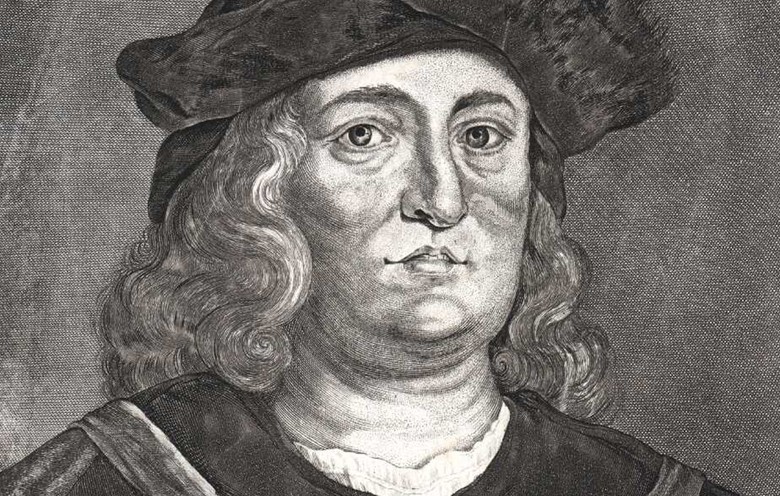
A source
“Phillip Theophrastos is the title of Doctor of Medicine, which many have healed the ulcer, leprosy, gout, dropsy and some incurable infectious diseases of the body with miraculous art. In the year 1541, on the 24th day of September, he changed his life to death. ”
475 years ago, this inscription appeared on the tomb of Philip Avreol of Theophrastus Bombast von Hohenheim better known as Paracelsus. An outstanding doctor, philosopher, naturalist, alchemist, astrologer and wizard of his time. You can assume that Paracelsus was a supercomputer of the beginning of the Renaissance.
Even people far from medicine could hear Paracelsus saying: “Everything is poison, and nothing is without poisonousness; only one dose makes the poison imperceptible. " In a simplified statement, the phrase usually sounds like this: “Everything is poison, everything is medicine; both determine the dose. ”
Paracelsus believed that medications are mostly poison, but the correct dosage allows you to influence the source of the disease, not the symptom. Fascinated by chemistry, he wrote treatises on the proper treatment with doses of mercury, copper, antimony, iron, arsenic. Subsequently, these works became the basis of pharmacology.
Among the "colleagues", Paracelsus had a bad reputation: he did not rely on the dogmas that had developed over the centuries and was striving for new knowledge, while at the same time reforming all medical science. The doctor constantly updated his knowledge base, traveled a lot and communicated with surgeons, alchemists, soothsayers, scientists and even ordinary vagrants.
With all the outstanding talents and numerous cases of real healings of the hopelessly sick, Paracelsus was mistaken countless times. He treated syphilis by rubbing mercury ointment into the patient's feet (it helped a lot). Prescribed drugs caused him poisoning. Medicinal herbs selected by occult methods had no effect. He diagnosed patients by the way the mirror misted on their surface when they breathed, and used mirrors to heal, reading spells on them and “coaxing” dark energies into a reflection of the patient.
Paracelsus believed that a doctor without knowledge of astrology is not able to make a correct diagnosis to the patient, and even more so, to help him. And finally, he began to rely on alchemy to find out the causes of cancer. Paracelsus burned the tumor with a hot iron, and then investigated the burned areas - this is the diagnostic method.
Why, despite numerous failures and death, Paracelsus went down in history as one of the greatest doctors? Because he perceived failure as an invaluable experience, thanks to which medical science changed. Fortunately, now, to get new knowledge, no need to risk people. But is the medicine of the new time, in which the human factor is gradually leveled, freed from countless mistakes?
IBM plays all-in

A source
The intelligence of the machine depends on what data is loaded into it: medical records, x-rays, CT / MRI results, and more. Since Watson was used to refine symptoms and make a diagnosis, as well as to combat medical fraud (for example, improperly prescribed medications, frauds with medical bills), IBM has spent more than $ 4 billion to buy several companies with huge reserves. medical data.
The Watson business unit now has more than 10,000 employees, but IBM continues to make long-term and extremely expensive investments, linking the fate of the entire company with the success of a single project.
And the results are already there. IBM Watson extracted and evaluated a large amount of structured and unstructured data from medical records using natural language processing and machine learning. Now Watson provides oncologists with sufficient guidance on the treatment of breast, lung, colorectal and some other cancers.
In order to make such accurate diagnoses, Watson has to get comprehensive answers from patients that could reveal a potential source of the disease. The computer needs to know about your childhood, habits and even the presence of pets.
Watson was clinically tested at several medical centers, where he worked with a group of oncologists. In one of the centers, a group of doctors examined cases of 638 patients with breast cancer, for which Watson, based on the data obtained, made its own recommendations for treatment in three categories: standard treatment, for further discussion, the prescribed treatment is not recommended.
In 90% of cases, Watson recommended standard tumor therapy, and these tips coincided with the recommendations of doctors.
But in some cases, the level of consistency was less than percent, and varied depending on the type of cancer. In general, it was noted: the less treatment options the medicine recognizes in individual cases, the more Watson has “hits” on the target.
The study also compared how long it took to collect and analyze data to develop recommendations. On average, this procedure takes 20 minutes when done manually, but with a lot of experience working as a doctor is reduced to 12 minutes. Watson, on the other hand, spent an average of 40 seconds per patient for data collection, analysis and treatment recommendations.
Watson is obviously not Dr. House, but at the same time, the computer is already able to speed up the doctor’s work 18 times.
At the University of North Carolina Medical School, 1000 oncological diagnoses were prepared for Watson - and not just one species, as in the example above. In 99% of cases, Watson was able to recommend the same treatment methods as professional oncologists suggested, but in 30% of cases he also found a treatment option that the doctors missed. Some treatments were based on research papers that doctors simply did not have time to read - more than 160,000 documents on cancer research are published every year. Other treatment options may have just appeared in new clinical trials and oncologists simply did not see a similar text on the Internet.
In the practice of Watson come across and unique cases. When the treatment of a patient suffering from leukemia was ineffective, a group of Japanese doctors turned to IBM for help. Watson was able to determine that the woman actually suffered from a rare form of leukemia, which doctors could not identify. To make a correct diagnosis, Watson compared the patient's genetic data with information from 20 million oncological studies.
Criticism: Watson is not what it seems

You have lupus!
So we came to the point where the article appeared. So, there is an opinion that Watson is a veiled advertising campaign intended for selling various IBM cloud services.
Why do we need advertising that makes a big bet on the salvation of all mankind? The fact is that IBM has been losing profits for several years now, and the company's total debt is $ 44.5 billion. For two years IBM demonstrated the weakest dynamics in the “elite” Dow Jones index: the stock price fell from January 2013 to January 2015. This has happened only once in history: the blue chips of Bethlehem Steel, one of the leading companies in the market, in the mid-90s also crashed for two years in a row. Then the company went bankrupt.
Obviously, IBM did not want to collapse and began to massively invest in branding cloud offerings, and Watson successfully helped to create an image of the technological future and stopped the excitement of investors.
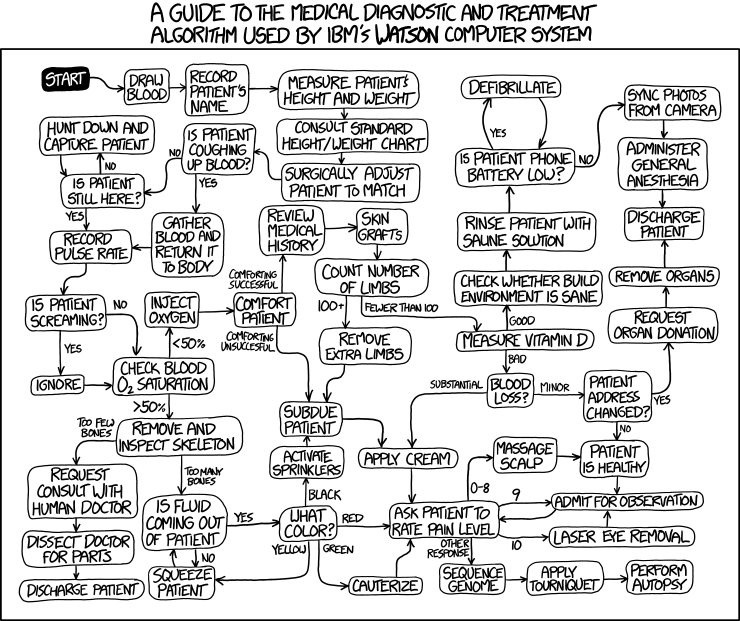
The problem is that the capabilities of the IBM supercomputer and cloud technologies are not much superior to the capabilities of a regular search service. Watson can confirm what the doctor already knows, but a person already knows the diagnosis and is confident in his choice if this is a good specialist.
Can Watson suggest a treatment that the oncologist didn't think about? Anyone who reads the article can do this: leeches, bloodletting, alchemy, acupuncture, chiropractic, homeopathy, palmistry, electroconvulsive therapy, lobotomy, voodoo magic. There are thousands of other treatments that an ordinary doctor would not have thought of.
If Watson says that there is some alternative way to cure the patient, this does not necessarily mean that the way is generally viable. Among all the published materials, not a word is said about whether doctors changed the treatment method depending on the advice of Watson. No, they could correct the diagnosis, this is true, but the doctor himself always treated the person.
Another problem is the fact that Watson can only view already written and digitized information about the disease, which means that it is more difficult for him to detect more rare diseases with a small amount of clinical studies simply because there is not enough data available. No, Watson obviously cannot compare with Dr. House.
IBM press releases had the impression that they could create something more powerful than a program that would read all existing medical records and recommend treatment for a given set of symptoms. However, so far the most notable and most publicized achievement of Watson was a victory in Jeopardy (“Own game”) back in 2011.
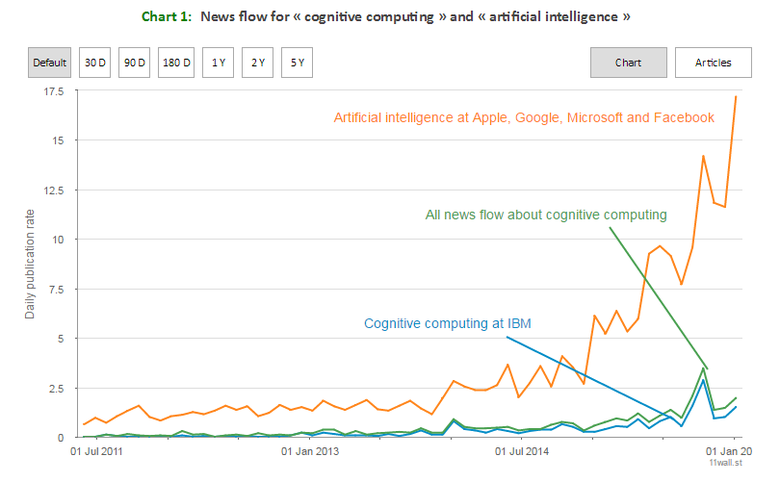
IBM's Watson: A Disaster In The Making
Watson is the pinnacle of IBM’s “cognitive computing” effort, but in practice, these words are behind the flow of information that is generated internally within the company. IBM uses “cognitiveness” to describe a universal artificial intelligence algorithm, but all existing AI applications are designed to perform narrow, specific tasks: to recognize, for example, a cat in a photo.
One of the largest companies in the world is surprisingly alone in this approach: more than 85% of the news on "cognitive computing" in the last 5 years has been generated by IBM itself. All other technological giants rely on less ambitious projects, with much more direct and accurate names.
A ray of light
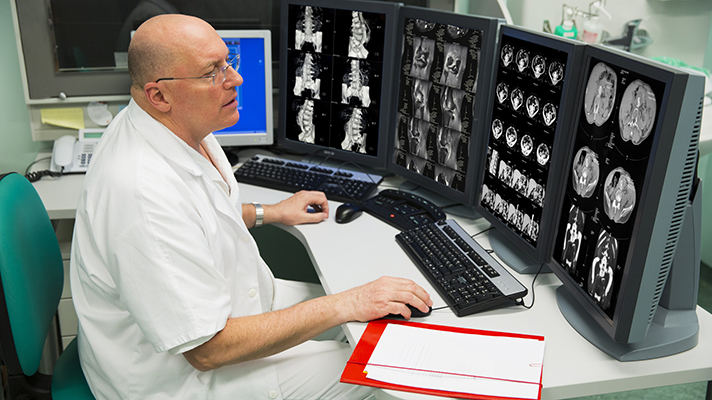
Even if we take into account the most pessimistic forecast - Watson is a bloated advertising project for sales of cloud technologies - one cannot get rid of two facts: this is a machine, and it works. Never before in the whole of human history have people received such a powerful help in making diagnoses.
Is it possible that negative maxims are born not least of all from the doctors themselves? Suppose a supercomputer correctly diagnoses a disease and prescribes a treatment, why does this system need a person at all if it does not lie on a hospital bed?
History does not bode well for lawyers, doctors and truck drivers. Yes, Watson works in many ways no better than a person, and not even as good as a person, but he never sleeps, does not rest, does not eat, does not ask for leave, does not go on maternity leave, does not require an increase in salary, as well as the salary itself. He cannot be mistaken because he celebrated his birthday yesterday, drunk, tired, old, nervous, scared, wondered, hooked on Vicodin. As you read these lines, Watson continues to study. And while we may assume that a brain tumor is more complicated than a game of Guo, but Guo fell yesterday, and diagnostics is next in line.
The article used materials:
» Expert Systems
» Health Mail.Ru
» IBM is Counting the Money for It
Watson correctly detected women after doctors were stumped
I like the Watson AI 99% of Cancer Cases
» THIS R EXTENSION GIVES DATA SCIENTISTS ACCESS TO IBM WATSON
» Dr House goes digital as IBM's Watson diagnoses rare diseases
» IBM Watson accurately matches oncologists' advice, study finds
IBM's Watson: A Disaster In The Making
» Medicine, diagnosis and treatment in the Middle Ages
» Http://xkcd.com/1619/
Source: https://habr.com/ru/post/399919/
All Articles